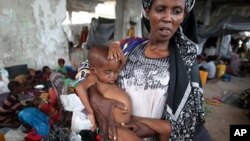The International Committee of the Red Cross (ICRC) says there still is time to avert a potentially catastrophic famine in Somalia — but only if donors act now to support critical humanitarian operations.
Mogadishu officials have declared drought in seven regions and warned of a possible repeat of the 2011 famine in which more than one-quarter of a million people died, half of them children, unless urgent measures are taken to head off the worst.
Eric Marclay, ICRC head of operations for East Africa, tells VOA that although specialists on the ground in Somalia do not yet see signs of widespread famine, they warn the situation could change.
“If large-scale humanitarian aid is slowed down or, even worse, disrupted, the situation for the population will become unbearable and we cannot exclude [the possibility] of having people dying of hunger,” he said.
Several factors have triggered the current crisis. The U.N. Food and Agriculture Organization says drought in some areas and heavy rains and flooding in others are devastating Somalia’s crop production, leading to severe food shortages. The organization also says conditions are causing a surge in food prices and a reduction in livestock production.
According to Marclay, ongoing conflict between the government and al-Shabab rebels is forcing people to flee their homes, disrupting their daily lives and having a long-term impact on livelihoods, agriculture and livestock.
The U.N. refugee agency reports 1.1 million people are internally displaced in Somalia. Marclay says recent new waves of displacement are adding to this number and that Central and South Somalia are most seriously affected by the natural disasters and violence.
ICRC has distributed food to more than 80,000 displaced and vulnerable people in areas affected by conflict or insecurity. The group is also scaling up humanitarian operations in the country to meet increased and urgent nutritional needs of thousands of people.
“We are expanding foods and nutrition to a number of centers that we have because ... children are at risk. Elderly are at risk. The weak and sick people are definitely at risk,” said Marclay.
The U.N. Food and Agriculture Organization reports more than 200,000 children under the age of five are acutely malnourished and that nearly three million people in Somalia need urgent lifesaving and livelihood support.
Numerous international agencies have called upon donor countries must do more to help Somalia ward off a deepening of the crisis. Some say response to their appeals has been tepid, with only 29 percent of funding needed to mount critical humanitarian operations has been received, leaving a wide funding gap of $664 million.




